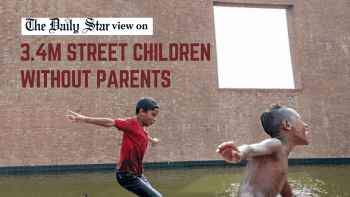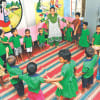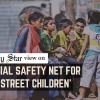Are we leaving street children to their fate?

Amid the myriad economic, political, social, and other challenges that Bangladesh has been dealing with in recent times, there is one particular issue that is not getting enough attention: the plight of street children who continue to live in a state of deprivation, humiliation, and abuse. According to a 2022 survey by the Bangladesh Bureau of Statistics (BBS), about 80 percent of street children face some form of harassment or torture on the streets. This data alone paints a horrific picture about their vulnerability which needs to be rectified.
While there is no specific data on the number of children living in street situations, a UNICEF study estimates that there could be at least 34 lakh such children living without parental care. The BBS survey also found that 82 percent of these children are male, the majority of whom end up on the streets due to poverty. About 36 percent have never experienced any formal or informal education. They also don't have access to basic amenities, let alone a safe environment to live in, and are forced to survive on begging or menial jobs like waste-collecting, working in tea stalls, factories or workshops, which put them at risk of injuries, not to mention exploitation. Most of those working have to toil 30-40 hours per week for less than Tk 1,000, as per the BBS survey.
It's distressing to think of the cycle of poverty, insecurity, and social stigma that these children remain stuck in. They are vulnerable to violence—physical, mental, and sexual—and most of them don't know whom to reach out for help. Many end up getting addicted and involved in petty crimes. This state of affairs must be addressed. In the new Bangladesh where we expect the rights of every citizen to be upheld without exception, a special focus must be given to the well-being of these vulnerable street children, who have every right to grow up like other children.
Therefore, we urge the government to adopt a comprehensive plan to bring all street children under the state's care. To this end, a robust, well-funded child protection system must be developed with extensive rehabilitation facilities. In addition, awareness must be raised so that society, including well-off families, come forward to help them. It is also worth remembering that not helping the street children means that the nation will continue to lose out in terms of human resources that can significantly contribute to our economic and intellectual growth.


 For all latest news, follow The Daily Star's Google News channel.
For all latest news, follow The Daily Star's Google News channel. 










Comments